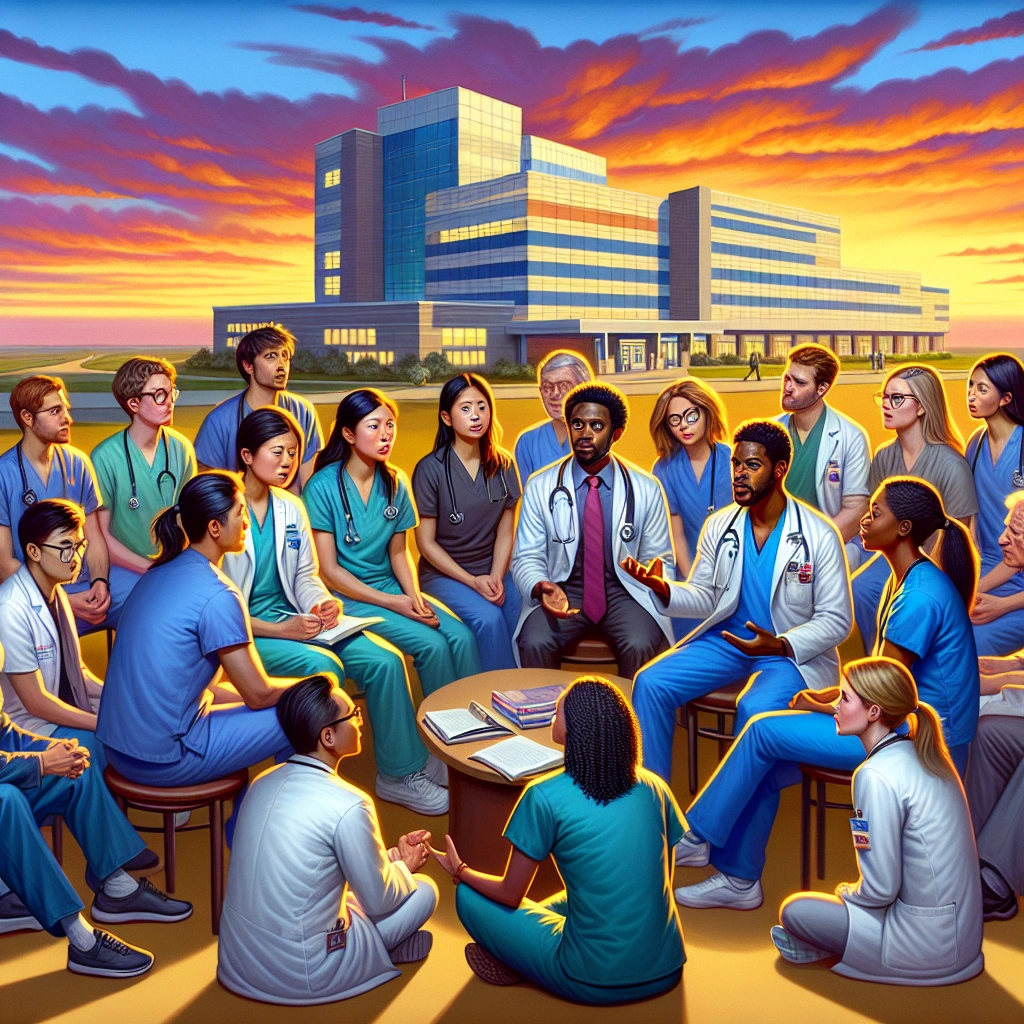

When applying for residency, there are several key milestones in the application process that applicants need to be aware of. These milestones include obtaining the necessary medical licensing exams such as USMLE or COMLEX, submitting the Electronic Residency Application Service (ERAS) application, and completing personal statements and letters of recommendation.
Additionally, applicants will need to participate in residency interviews and rank their preferred programs through the National Resident Matching Program (NRMP).
It is important for applicants to understand the timeline for these milestones, as they can vary depending on the specialty and program. For example, some specialties may have earlier deadlines for submitting applications, while others may have later interview dates.
Understanding these key milestones is crucial for a successful residency application process.
Understanding Residency Programs
What are residency programs?
Residency programs are specialized training programs for medical school graduates, providing hands-on experience and advanced medical education in a specific healthcare field, such as internal medicine, surgery, or pediatrics.
Importance of residency programs in medical careers
Residency programs are crucial for shaping successful medical careers as they offer practical exposure, skill development, and specialized knowledge essential for delivering quality patient care. These programs also provide training satisfaction, improved analytical skills, and better clinical decision-making.
Choosing the Right Residency Program
When researching residency programs, it’s crucial to consider the competitiveness and ranking of each program. Look for reputable sources to determine the top residency programs in your desired field.
Consider factors such as the program’s ability to prepare residents for future training or position, resident esprit de corps, faculty availability and involvement in teaching, depth and breadth of faculty, and the variety of patients and clinical resources.
Researching residency programs
Consider recent data from reliable sources such as Doximity’s Physician Compensation Report, NRMP Match’s Match Summary for MD Seniors, and NMRP’s Charting Outcomes in the Match. Evaluate the competitiveness of each program to gauge its level of desirability and the likelihood of acceptance.
Bolster your research by seeking insights from current residents and practicing physicians.
Factors to consider when choosing a residency program
When choosing a residency program, applicants weigh factors such as the desired geographic location, perceived goodness of fit, program reputation, work-life balance, and the program’s ability to support future career goals. It’s essential to prioritize factors that align with your personal and professional aspirations, ensuring a mutually beneficial match for both you and the program.
| Residency Program | Competitiveness Ranking | Program Suitability | Geographic Location | Reputation | Work-Life Balance |
|---|---|---|---|---|---|
| Program A | High | Excellent | Urban | Esteemed | Balanced |
| Program B | Moderate | Good | Suburban | Respected | Challenging |
| Program C | Low | Fair | Rural | Well-Known | Flexible |
Preparing Your Application
Components of a residency application
- Step scores
- Clinical grades
- Letters of Recommendation
- Personal Statement
- Extracurricular activities
- Hobbies
Tips for a strong residency application
- Don’t lock in your application prematurely
- Ask faculty for advice
- Begin early
- Research the program before the interview
Key Milestones in the Residency Application Process
Completing the ERAS application
Completing the ERAS application is a crucial milestone. It involves compiling various documents such as the personal statement, letters of recommendation, USMLE and COMLEX-USA transcripts, and other essential reports.
Securing strong letters of recommendation
Securing strong letters of recommendation is vital for standing out. This involves approaching faculty members in your desired specialty and requesting compelling endorsements that highlight your candidacy for residency programs.
Crafting a compelling personal statement
Crafting a compelling personal statement is a key step. This involves expressing your passion, experiences, and aspirations eloquently, showcasing your suitability for the residency program.
Preparing for residency interviews
Preparing for residency interviews is an essential milestone. This includes researching the programs, practicing interview questions, and refining your communication skills to make a positive impression.
The Interview Process
Importance of Residency Interviews
Residency interviews are crucial as they provide an opportunity for programs to assess candidates beyond their application materials. It allows for a deeper evaluation of the applicant’s interpersonal skills, professionalism, and overall fit for the program.
What to Expect During Residency Interviews
During residency interviews, candidates can expect to engage in one-on-one or panel interviews with faculty and current residents, tour the facilities, and participate in social events. These interviews serve as a platform for applicants to showcase their personalities and gain insight into the program’s culture and structure.
Tips for a Successful Residency Interview
To excel in residency interviews, candidates should prepare by researching the program, practicing responses to common questions, and developing insightful questions to ask the interviewers. It’s vital to convey enthusiasm, professionalism, and a genuine interest in the program to leave a lasting positive impression.
After the Interview
How to follow up after residency interviews
After the residency interview, it is crucial to send generous communication to the programs. Explicitly communicate where the residency program stands on your list, expressing your intention to rank them highly.
This demonstrates your keen interest and may positively influence their decision.
Weighing program options and making a decision
Following the interviews, take time to jot down your initial thoughts about each program. Consider factors such as perceived goodness of fit, desired geographic location, work-life balance, and the quality of residents in the program.
It’s important to evaluate these factors carefully to make an informed decision.
| Factors to Consider |
|---|
| Perceived goodness of fit-86% |
| Desired geographic location-84% |
| Work-life balance-78% |
| Quality of residents in the program-75% |
Submitting Your Rank Order List
To understand the Match process, it is crucial to comprehend how the matching algorithm works. The matching algorithm follows an “applicant-proposing” model, aiming to allocate an applicant to the program indicated as most preferred on their rank order list.
This process plays a pivotal role in the residency application journey.
How to compile and submit your rank order list
Compiling and submitting your rank order list is a critical phase in the residency application process. It involves meticulous planning and strategic decision-making to ensure the inclusion of programs where you are genuinely willing to go.
It’s essential to create a diverse list including highly competitive programs as well as safety options to maximize your chances of a successful match.
| Key Steps |
|---|
| Build professional and academic experience |
| Research residency programs in your chosen medical specialty |
| Apply to residency programs |
| Interview with residency programs |
| Rank at least between 10 and 15 programs |
The article by Shemmassian provides valuable insights into crafting an effective rank order list, emphasizing the need for a mix of more and less competitive programs and the inclusion of at least one “safety” option to optimize the match outcome.
Match Day
What happens on Match Day
On Match Day, graduating medical students find out where they will be completing their residencies. This day marks the culmination of years of hard work and determination.
At noon EST, these students gather to open their envelopes and reveal their future placements. It’s a moment filled with anticipation, anxiety, and excitement as their destinies are unveiled.
Dealing with different Match outcomes
Dealing with different Match outcomes can evoke a range of emotions. For those who match with their top-choice programs, there is jubilation and relief.
Conversely, for those who do not match or match with a program they did not prefer, there may be disappointment and a need to quickly adapt to unexpected circumstances. It’s a time when resilience and comradery amongst peers is most crucial in navigating the various emotions and preparing for the next steps.
Transitioning to Residency
Transitioning to residency can be a daunting but exciting time. As you prepare for this transition, it’s essential to focus on developing a healthy work/life balance.
Determining your work/duty hours and available vacation time will allow you to plan for personal time, ensuring you maintain a sense of well-being amidst the demands of residency.
Preparing for the transition
Before starting residency, it’s crucial to make the most of your time transitioning from medical school. The four years of med school have partially prepared you for the demands of a medical residency program.
Use this time wisely to equip yourself with the necessary knowledge and skills to excel in your new role. Additionally, consider exploring resources such as the AMA Road to Residency Guide to gain valuable insights into the residency application process.
Key steps to take before starting residency
Prior to beginning your residency journey, there are several important steps to take. Firstly, ponder your relocation priorities and consider the changes in both a clinical and personal capacity.
It’s essential to familiarize yourself with the healthcare system, electronic medical records (EMR) systems, clinical procedures, and the financial aspects of transitioning from a student to a resident.
Recommended Amazon Products for Crafting a Compelling Personal Statement
Here’s a curated list of products that can help you craft a compelling personal statement for your residency application. These recommendations are based on the functionality, price, and reviews.
Product: “How to Write the Perfect Personal Statement” by Mark Alan Stewart
This comprehensive guide offers valuable tips and examples to help you create a standout personal statement. The positive reviews and affordable price make it a great investment for applicants. You can find the “How to Write the Perfect Personal Statement” on Amazon here.


Product: “65 Successful Harvard Business School Application Essays” by Dan Erck
Although focused on business school essays, this book provides excellent guidance on crafting impactful personal statements. Its proven strategies and diverse essay examples make it a valuable resource. You can find “65 Successful Harvard Business School Application Essays” on Amazon here.


Product: “The Premed Playbook: Guide to the Medical School Personal Statement” by Ryan Gray and Alison Lauter
While targeted at medical school applicants, this book offers relevant advice and strategies applicable to residency personal statements. Its practical insights and expert guidance can help you create a compelling narrative. You can find “The Premed Playbook: Guide to the Medical School Personal Statement” on Amazon here.


Product: “15 Days to a Great College Essay” by J. D. Sharpe
Despite its title, this resource provides a structured approach to essay writing that can be adapted to crafting personal statements for residency applications. It offers a step-by-step guide and practical exercises to develop strong writing skills. You can find “15 Days to a Great College Essay” on Amazon here.


Product: “The Medical School Admissions Guide: A Harvard MD’s Week-By-Week Admissions Handbook” by Suzanne M. Miller
While tailored for medical school admissions, this guide offers valuable advice for crafting persuasive personal statements. Its detailed approach and structured timeline can help applicants organize their thoughts effectively. You can find “The Medical School Admissions Guide: A Harvard MD’s Week-By-Week Admissions Handbook” on Amazon here.


The pros and cons of each recommended product are listed in the table below:
| Product | Pros | Cons |
|---|---|---|
| “How to Write the Perfect Personal Statement” | Comprehensive, good reviews, affordable | Focus may not be exclusively on residency applications |
| “65 Successful Harvard Business School Application Essays” | Proven strategies, diverse examples | Not specifically tailored to medical residency applications |
| “The Premed Playbook: Guide to the Medical School Personal Statement” | Practical insights, expert guidance | Primarily oriented towards medical school applicants |
| “15 Days to a Great College Essay” | Structured approach, practical exercises | May need adaptation for residency-specific content |
| “The Medical School Admissions Guide: A Harvard MD’s Week-By-Week Admissions Handbook” | Detailed approach, structured timeline | Focuses on medical school admissions, not just personal statements |
Top Recommended Product for Crafting a Compelling Personal Statement
If you’re looking for the best solution for crafting a compelling personal statement for your residency application, we highly recommend “How to Write the Perfect Personal Statement” by Mark Alan Stewart. Here’s why:
With its comprehensive guidance, positive reviews, and affordable price, “How to Write the Perfect Personal Statement” is the ideal resource to help you create a standout personal statement. Ready to improve your personal statement? Check out “How to Write the Perfect Personal Statement” today for the best results! You can find “How to Write the Perfect Personal Statement” here on Amazon.


Conclusion
It is evident that the impact of climate change on polar bears is significant and alarming. The loss of sea ice due to global warming has led to a decline in the population and habitat of polar bears.
Human activities such as carbon emissions and deforestation continue to exacerbate the situation.
Furthermore, efforts to mitigate climate change and protect the polar bear population are crucial for their survival. Conservation measures such as reducing carbon emissions, promoting sustainable practices, and creating protected areas for polar bears are essential.
Additionally, raising awareness and taking action at the individual, community, and government levels are necessary to address the threats facing polar bears.
The future of polar bears is inextricably linked to global efforts to combat climate change. It is imperative that we prioritize the protection of their habitat and take meaningful steps to reduce our impact on the environment.
Only by working together can we secure a sustainable future for polar bears and the planet as a whole.











